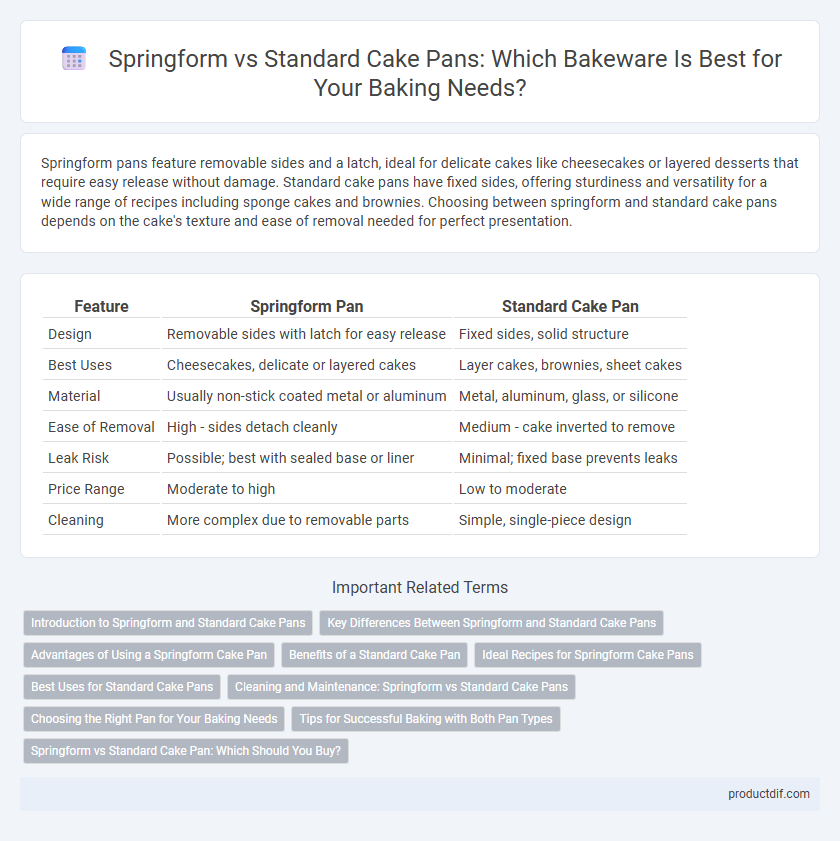Springform pans feature removable sides and a latch, ideal for delicate cakes like cheesecakes or layered desserts that require easy release without damage. Standard cake pans have fixed sides, offering sturdiness and versatility for a wide range of recipes including sponge cakes and brownies. Choosing between springform and standard cake pans depends on the cake's texture and ease of removal needed for perfect presentation.
Table of Comparison
| Feature | Springform Pan | Standard Cake Pan |
|---|---|---|
| Design | Removable sides with latch for easy release | Fixed sides, solid structure |
| Best Uses | Cheesecakes, delicate or layered cakes | Layer cakes, brownies, sheet cakes |
| Material | Usually non-stick coated metal or aluminum | Metal, aluminum, glass, or silicone |
| Ease of Removal | High - sides detach cleanly | Medium - cake inverted to remove |
| Leak Risk | Possible; best with sealed base or liner | Minimal; fixed base prevents leaks |
| Price Range | Moderate to high | Low to moderate |
| Cleaning | More complex due to removable parts | Simple, single-piece design |
Introduction to Springform and Standard Cake Pans
Springform pans feature removable sides secured by a latch, making them ideal for delicate cakes like cheesecakes and tortes that cannot be easily inverted. Standard cake pans consist of fixed, solid walls and are typically used for layered cakes and brownies due to their sturdy, non-removable sides. Choosing between these pans depends on the cake type and the necessity for easy release after baking.
Key Differences Between Springform and Standard Cake Pans
Springform pans feature removable sides secured by a latch, enabling easy release of delicate cakes like cheesecakes without inverting or damaging the edges. Standard cake pans have fixed sides, requiring cakes to be flipped out after baking, which suits denser cakes such as layer cakes and sponge cakes. The choice between springform and standard cake pans depends on cake type, ease of removal, and presentation requirements.
Advantages of Using a Springform Cake Pan
Springform cake pans offer the advantage of easily removing delicate cakes, such as cheesecakes and tarts, without damaging their shape or surface. The removable sides and base enable clean release, minimizing the risk of cracks or breaks compared to standard cake pans. This design also simplifies presentation and serving, making springform pans ideal for intricate or layered desserts.
Benefits of a Standard Cake Pan
A standard cake pan offers superior heat distribution, ensuring even baking and consistent texture throughout the cake. Its solid, non-removable sides provide sturdy support ideal for delicate batters and layered cakes. Compatible with a variety of baking recipes, standard cake pans are durable, affordable, and easy to clean compared to specialized pans like springform ones.
Ideal Recipes for Springform Cake Pans
Springform cake pans excel in baking delicate cheesecakes, mousse cakes, and tortes that require careful removal to maintain their shape and texture. Their removable sides make them ideal for recipes with soft or layered fillings that are difficult to invert, such as layered chocolate mousse cakes and classic New York-style cheesecakes. Compared to standard cake pans, springform pans help preserve intricate designs and creamy consistencies without damaging the finished dessert.
Best Uses for Standard Cake Pans
Standard cake pans excel in baking dense and layered cakes where uniform heat distribution is crucial for even rising and consistent texture. Their solid, enclosed sides make them ideal for recipes requiring firm structure, such as pound cakes and brownies. These pans also work well for casseroles and savory bakes, offering versatility beyond traditional cake baking.
Cleaning and Maintenance: Springform vs Standard Cake Pans
Springform pans have removable sides and a latch mechanism that often trap batter in crevices, making cleaning more labor-intensive than standard cake pans, which feature a single solid structure. Standard cake pans typically require less meticulous scrubbing and are dishwasher-safe, ensuring easier maintenance and durability. Proper cleaning of springform pans involves careful hand washing and thorough drying to prevent rust and ensure the latch remains functional, which is less critical for standard pans.
Choosing the Right Pan for Your Baking Needs
Springform pans feature removable sides and a latch, making them ideal for delicate cakes like cheesecakes or tortes that require gentle removal. Standard cake pans, typically solid and rigid, excel at evenly baking layered cakes and offering stability for stacked designs. Selecting the right pan depends on the cake's texture and presentation, ensuring optimal baking results and ease of serving.
Tips for Successful Baking with Both Pan Types
To achieve perfect results with springform pans, ensure the removable sides are securely locked and wrap the bottom with aluminum foil to prevent leaks, especially for thin batter recipes. Standard cake pans benefit from thorough greasing and flouring or using parchment paper to promote easy release and even browning. Adjust baking times slightly between the two, as the springform's construction may cause slower heat conduction.
Springform vs Standard Cake Pan: Which Should You Buy?
Choosing between a springform and a standard cake pan depends on the type of baking and ease of cake removal desired. Springform pans feature removable sides, ideal for delicate and layered cakes like cheesecakes, providing effortless release without damaging the cake's shape. Standard cake pans offer durability and versatility for everyday baking but often require careful flipping or lining to avoid sticking or breaking.
Springform vs Standard cake pan Infographic

 productdif.com
productdif.com